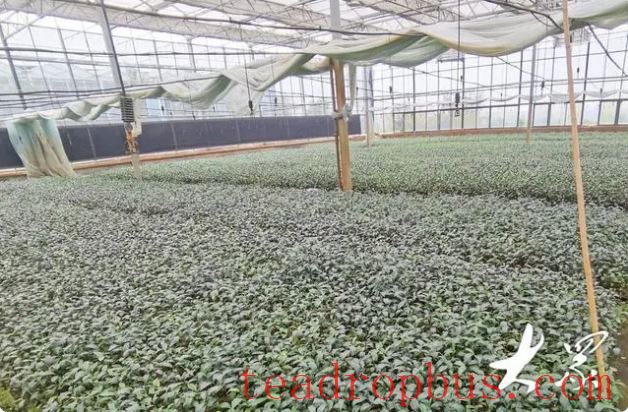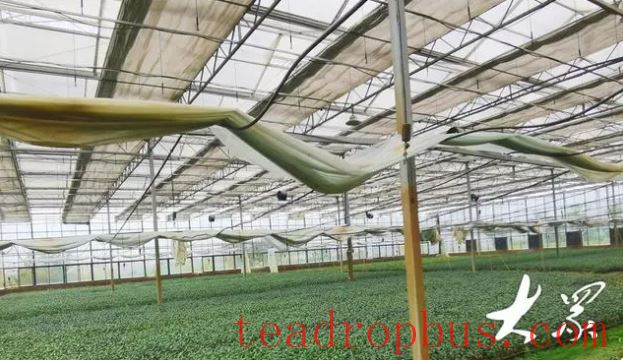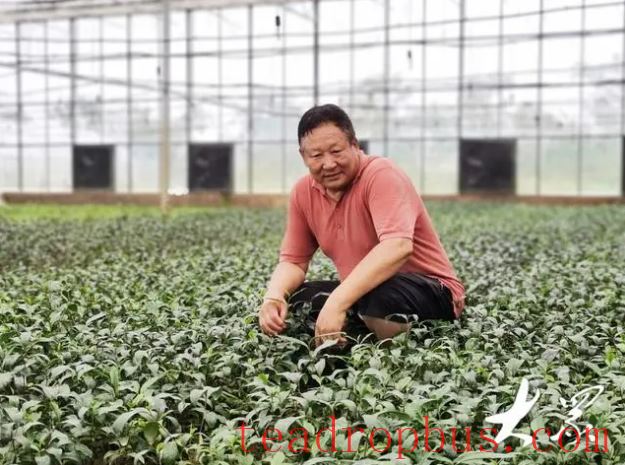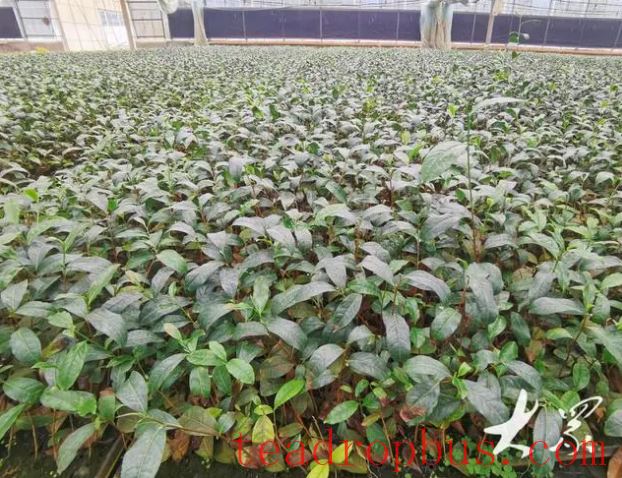On the morning of July 24, 2024, inside a high-end, interconnected greenhouse in Tuanlin Town, Junan County, Shandong Province, millions of Tea seedlings are growing comfortably, safe from wind and rain.

Tea seedlings within the clonal tray nursery base.
This high-end, interconnected greenhouse is part of the clonal tray nursery base established by Shandong Yimeng Green Tea Co., Ltd., covering an area of 27,000 square meters and capable of simultaneously cultivating 10 million seedlings. Adjacent to the greenhouse is a 200-acre tea garden.
Speaking about the construction of the greenhouse and the development of the tea garden, Li Chuanding, technical advisor for Shandong Yimeng Green Tea Co., Ltd., said, “The purpose is clear: to change tea production from seeding to planting.”
Li Chuanding, now 68 years old, worked at the Fruit and Tea Center of the Junan County Department of Agriculture and Rural Affairs before retirement and has extensive knowledge about the introduction of southern tea varieties to northern China as well as their cultivation and management techniques in Junan.
Li Chuanding explained that previously, tea was grown by directly sowing seeds into the ground, which then germinated and grew into tea trees. With advancements in technology, new or renovated tea gardens in the south no longer sow seeds but instead transplant tea seedlings. For this reason, Li Chuanding made eight trips to the south, visiting Zhejiang, Fujian, and other provinces to study local tea production.

Within the clonal tray nursery base, tea seedlings protected layer by layer.
“Tea trees grown from seeds are sexually propagated, which can easily lead to mutations. The resulting tea trees may not have identical characteristics, and they produce low yields and poor-quality tea,” said Li Chuanding. “In recent years, the tea seedlings transplanted in the south are clonally propagated, ensuring that the seedlings planted in the ground do not mutate.”
To carry out clonal propagation, one first needs clonal tea, whose branches can be cut and rooted to become clonal tea. When large areas of clonal tea gardens were being developed in the south, Li Chuanding learned that the north primarily still used seeds. In 2008, Shandong Yimeng Green Tea Co., Ltd. leased 300 acres of hilly land and began constructing a clonal tea seedling nursery base.
Li Chuanding mentioned that the greenhouse was built because its protection allows cuttings to grow with minimal weather impact; using tray propagation improves the survival rate after transplantation. Trays are carried into the fields, and tea seedlings are taken from the trays and planted in the ground, with minimal damage to their root systems. The 200-acre tea garden is mainly for providing cuttings, so only clonal tea is planted there.
Clonal tea that grows well in the south might not adapt well to the north, especially in Shandong. Li Chuanding tried propagating more than 20 clonal tea varieties through cuttings before selecting seven varieties, including Fuding Dabai, Zhongcha 108, Golden Guanyin, and Hubei No. 1, which all suit the soil and climate conditions in Shandong.

Li Chuanding crouches among the tea seedlings, recounting his experiences with clonal tea propagation over the years.
In 2015 (the greenhouse was fully completed in 2025), Li Chuanding started mass-producing clonal tea seedlings. Li Chuanding said that clonal tea seedlings propagated through tray methods can be chosen for transplanting after one or two years, but they must be transplanted by the second year, otherwise, the small space in the tray will affect the growth of the seedlings.
The first batch of clonally propagated tea seedlings was released onto the market in 2016. “Initially, northern tea farmers did not accept these seedlings. By 2016, there were no large-scale clonal tea gardens in Shandong, and there weren't many in the entire northern region,” Li Chuanding said. In the early years, his company could only sell several hundred thousand seedlings annually.
The company now cultivates clonal tea gardens, with over 60% based on orders. Customers place advance orders specifying the variety and quantity required, and the company fulfills these requests. To date, the company has sold over 7 million clonal tea seedlings, with approximately 5,000 seedlings needed per acre of tea plantation. In previous years, the selling price was 1 yuan per one-year-old seedling and 1.5 yuan per two-year-old seedling; currently, the prices have dropped to 0.8 yuan and 1.2 yuan, respectively.
Clonally propagated tea seedlings not only improve the quality of the tea produced but also increase yield by 30%. Transplanted clonal tea seedlings, when properly managed, can achieve a survival rate of 70% to 80%. Moreover, because the seedlings are of a single variety and similar size, the resulting tea trees are uniform and easier to manage, particularly suitable for mechanical harvesting. “Eighty percent of our tea seedlings are purchased by customers in Shandong, with the remaining buyers from Jiangsu, Hebei, Shaanxi, and other regions,” Li Chuanding said. “Up to now, clonal tea gardens in Shandong account for less than 10%. It can be said that the market prospects for clonal tea seedlings are very promising.”

These are tea seedlings that have been propagated for over a year and will be transplanted into the tea garden next spring.
The operation of Shandong Yimeng Green Tea Co., Ltd. not only provides local farmers with clonal tea seedlings for developing new tea gardens or renovating old ones but also offers income-generating opportunities for local women and the elderly. The greenhouse requires a large number of workers for propagating seedlings, and the tea garden employs many people for tea picking. In recent years, the company has provided wages totaling around 700,000 to 800,000 yuan annually to farmers in the surrounding areas.
“The cultivation of clonal tea seedlings in Junan County represents a significant technological breakthrough in tea production after the introduction of southern tea varieties to the north. This can enhance the overall yield and quality of tea in Junan, and the Tuanlin Town Party Committee and government attach great importance to the development of Shandong Yimeng Green Tea Co., Ltd.,” said Chen Dexi, secretary of the Tuanlin Town Party Committee. “Tuanlin Town is mostly hilly and mountainous with sandy soil, making it ideal for tea tree cultivation. Well-managed tea gardens here can produce around 80 kilograms of dry tea per acre annually. Farmers planting tea trees on their own hillsides can earn around 7,000 to 8,000 yuan per year, making it a good industry for increasing farmers' incomes in Tuanlin Town.”